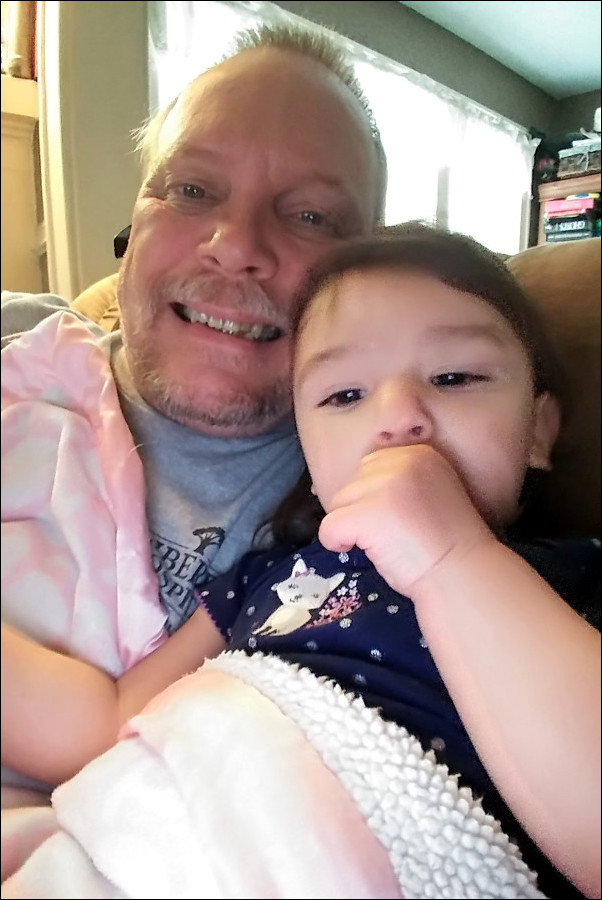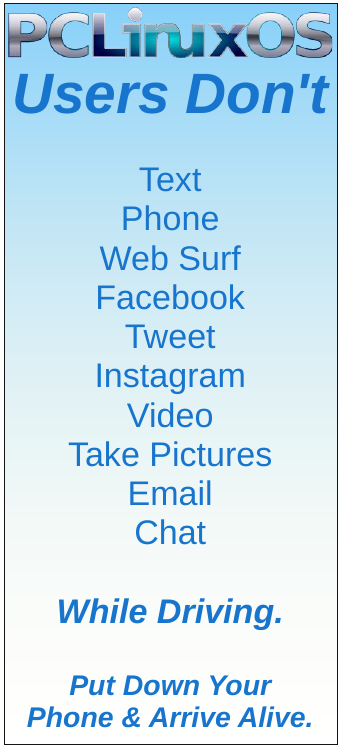| Previous
Page |
PCLinuxOS
Magazine |
PCLinuxOS |
Article List |
Disclaimer |
Next Page |
From The Chief Editor's Desk |
|
Granted, my "reference frame" may be skewed a bit, since I live in the U.S. But it is what I have to work with, and I realize other areas of the world don't necessarily "work" the same way. Plus, I'm sure other places might do some things better, while yet other places might do some things worse. Another thing that frames my point of view is the times that I grew up in. I'm a child of the 1960s, having actually been born in 1960. Some of you in the forum are older than me, and yet others of you are younger. I'm a product of an age that predates email, the world wide web, cell phones, VCRs/DVRs, and many other modern "conveniences." As the narrator guy (executive producer William Dozier, actually) said at the conclusion of every Batman episode, "Same Bat Time, same Bat Channel." If you missed the show's original airing, too bad; you'd have to wait until the reruns were broadcast. If you wanted to talk to someone, you talked to them on a telephone constrained by a cord ... or waited until the next day when you could talk to them face-to-face. If you wanted to send a message to someone, you had telegrams if it was super important, or you would sit down and write a letter (and mail it). If you wanted information about something, you either went to the local library, or if your family was fortunate enough to have a set of encyclopedias, you'd look it up there (we had a set of Funk & Wagnall's Encyclopedias, and that was a HUGE purchase for my parents in the early 1970s).  I have not ignored or shunned these technological advances. I spend more time than I probably should sending emails or looking stuff up on the web. I have a cell phone, and do send text messages and calls from it. As a family, we benefit from the use of the DVR that comes with our cable TV plan, as well as programming on DVDs and BluRays, all of which we can watch at our convenience. With all of these technological advances, there is a downside. That downside is that your digital communications and your personal data can be intercepted and read by others without you even knowing. "Back in the day," there was a pretty high confidence that our analogue landline telephone conversations weren't being listened in on or saved for who knows how long. If it was being done, we certainly weren't privy to it. Now, those actions are done in the open, and with the most cavalier of attitudes. "Back in the day," when you sealed up a letter and it arrived sealed to its addressee, there was a high level of confidence that its contents hadn't been tampered with or read, and the privacy of that letter was largely guaranteed. Those assurances and guarantees are largely gone now, in the digital age. Your web browsing history is used to target you for advertising, and in some cases, may incriminate you for things you haven't even done yet (or may, conversely, link you to your crimes). Your emails, phone calls and text messages are routinely intercepted or listened in on, and the "metadata" (who you call/text/email, when you call/text/email, their associates, the topic of your calls/texts/emails, etc.) are saved for who knows how long by people/agencies/governments with no real need to "know" such intimate details. I'm sure that Comcast knows more about my television viewing habits than Nielsen and Arbitron, two prolific media "ratings" businesses in the U.S., and certainly probably better than I know my own television viewing habits in my own house. My point is that there is more than enough "accidental" or incidental personal information floating around out there on each of us than anyone realizes. Not everyone has "good intentions" when accessing that data. Your personal information is the currency of the times. Your privacy is at stake. Your personal information can be -- and probably will be -- "weaponized" by some entity. "Back in the day," your private information and data were exactly that -- private. Which brings me to the grand point of this month's column: Cambridge Analytica and the Facebook data breach. The dust hasn't even started to settle yet from this one. "Back in the day," access to all of this private information and data wasn't necessary for the police to catch the criminals. The crimes were still solved. "Back in the day," advertising wasn't directed at individuals on an individually tailored basis, yet companies were able to prosper selling their goods and services. And all of this was possible without knowing my likes and dislikes, who I associated with, my political leanings or ideologies, or any other private information that is raked in and cultivated from my digital footprint. This has nothing to do with whether you have done anything right or wrong, or whether or not you have anything to hide. It's purely a principled matter. Why should anyone be able to have greater access to your private information and data than they would, for example, have to a letter you wrote to Aunt Midge? If we've gone throughout history -- and survived -- keeping such personal and private information and data private, then I suspect we'll survive the future just as well should we continue to keep such data private. I've said it here before, and I'll say it again: just because you can, doesn't mean you should. Just because you CAN access my private and personal information and data, doesn't mean you SHOULD. Shouldn't your private and personal information and data be kept private, regardless of its form or origin? I say unequivocally YES! So, until next month, I bid you peace, happiness, serenity and prosperity. Oh ... and guard your privacy vehemently and with purpose. |




